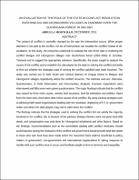| dc.description.abstract | The context of conflict is normally changed by the way the intervention occurs. When proper attention is not paid to the conflict, the act of intervention can escalate the conflict instead of de-escalation. In this study, the researcher undertook to evaluate the role of the state in resolving the conflict Bwejuu and Ukongoroni villages over Duchi/Gana forest (2002-2003) in Zanzibar, Tanzania and to suggest the appropriate solutions. Specifically, the study sought to analyze the causes of the conflict and to establish the role played by the state in solving the conflict and lastly to find out whether the strategies used in solving the conflict satisfied both sides involved. The study was carried out in both South and Central districts of Unguja Island in Bwejuu and Ukongoroni villages respectively where the conflict occurred. The methods used are: Interview, Questionnaire, A Field Observation and Documentary Analysis. Fourteen respondents were interviewed and fifty seven were given questionnaires. The major findings indicate that the conflict was caused by three main causes, namely land boundary, land for plantation and politics. Apart from the main ones, there were other minor causes of the conflict. By using various strategies such as allowing faith based organizations dealing with the resolution, deploying of F.F.U, government orders and others the state played a big role to calm down the conflict.
The findings indicate that the strategies used in solving the conflict did not satisfy the majority involved in the conflict, this is because of the partisan, Bwejuu farmers were not given land title deeds, and compensation was only done for Ukongoroni inhabitants and other factors. Based on the findings, recommendations such as the committees dealing with conflict resolution should avoid biasness during the resolution of the conflict and government should provide land title deeds to those who own land have been made which the researcher feels shall be beneficial to policy makers in government, non-government and international organizations in taking measures to handle well such conflict once it occurs and facilitate people to live in harmony and tranquility. | en_US |

